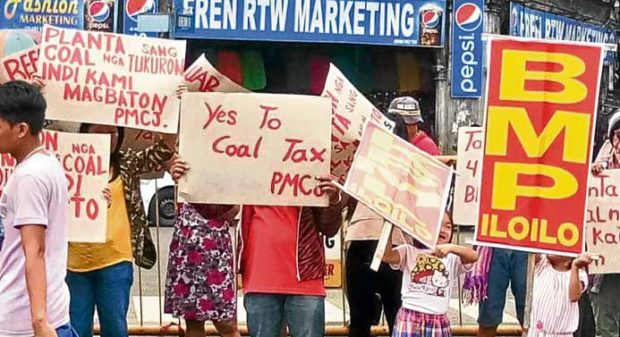
YES TO COAL TAX Members of the Philippine Movement for Climate Justice voice their support
for the imposition of tax on coal in a rally in Iloilo City. —PHOTO FROM PMCJ FACEBOOK PAGE
Was the TRAIN railroaded by the House of Representatives?
ACT Teachers Rep. Antonio Tinio questioned the ratification of the Tax Reform for Acceleration and Inclusion (TRAIN) bill past 10 p.m. on Wednesday, citing the lack of voting or even a quorum.
This was not the only last-minute snag faced by the tax measure on the last day of Congress’ session for the year.
The Senate ratification of the bicameral conference committee report, which reconciled conflicting provisions in the two chambers’ bills, also took place past 10 in the evening.
This was because Senators Loren Legarda and Joel Villanueva initially said the repeal of the tax exemption of locally produced coal was “deleted” from the report, a claim that House Deputy Speaker Miro Quimbo denied.
Voting in the Senate (16-4) pushed through as a result of a compromise on coal that the two panels reached at a meeting after the joint session of Congress on Wednesday.
Exempted from VAT
Under the reconciled TRAIN bill, the local coal industry would pay an excise tax but would be exempt from the 12-percent value added tax (VAT).
“Excise tax agreed to will apply to both imported and domestic coal. Current VAT exemption stays,” said Sen. Sonny Angara.
The reconciled bill would lower the personal income tax of salary-earners but raises the excise tax on a number of goods and services like petroleum products, automobiles, tobacco, sugar-sweetened beverages and cosmetic procedures.
Tinio said there were barely 10 people on the floor when Deputy Speaker Raneo Abu, who presided over the session, approved the motion of Deputy Majority Leader Arthur Defensor Jr. to ratify the bicameral conference committee report.
“Any objection? There is none. The motion is approved,” Abu said, ignoring Tinio’s screams of “Mr. Speaker, objection! Objection!”
Over in 2 minutes
Unlike in the Senate, no voting took place in the House. The adoption was over in just the last two minutes of the six-hour plenary session.
Tinio called the ratification “a total farce and travesty of so-called representative democracy,” saying lawmakers were not even furnished copies of the final report before its adoption.
He claimed many lawmakers were partying with PDP-Laban in a five-star hotel while imposing burdensome taxes on the people.
Tinio cited Rule X, Sec. 63 of the Rules of the House of Representatives, which stated: “A conference committee report shall be ratified by a majority vote of the members of the House present, there being a quorum.”
“Since there was no quorum and no actual vote was taken, the alleged ratification is clearly invalid,” he told reporters.
His ally, Bayan Muna Rep. Carlos Isagani Zarate, said in a separate statement that the Makabayan party-list bloc was studying options to question and stop the railroaded tax package.
“Obviously, the runaway train that would wreak havoc on our people with new burdensome taxes was not validly ratified,” Zarate said.
Presumption of regularity
But such a legal challenge would have to overcome the presumption of regularity in official actions, said Albay Rep. Edcel Lagman, who did not receive a copy of the report either.
In a press conference, Lagman said he was in his office waiting for the copies of the report to arrive—only to hear over the sound system that it was being adopted right then and there.
“I think there was a violation of the rules of plenary. It can always be challenged but there are always presumptions,” he said.
Majority Leader Rodolfo Fariñas told reporters that House members could contest the presiding officer’s report for the session by “bring[ing] it to the attention of plenary or, if not contented, to the courts.”
Coal
The tax exemption for local coal producers under Sections 16(a), 16(b) and 17(a) of Presidential Decree No. 972, meanwhile, survived the night.
As incentive for local coal producers, then President Ferdinand Marcos granted them exemption from all taxes except income tax, as well as payment of tariff duties and compensating tax on imported equipment.
Quimbo said it was “incorrect” to say that provision was repealed because “the House [contingent] never agreed to that repealing clause” during the deliberations.
Under the reconciled bill, the coal excise tax would be raised from P10 per metric ton to P50 per metric ton in the first year of TRAIN’s implementation: P50 in the second year and P150 in the third and succeeding years.
The P10 coal excise tax rate had remained unchanged since 1988 while the local industry had been exempted from paying excise tax since 1976, according to the Senate committee on ways and means.
Government stands to lose P5 billion if local coal continued to be exempted from taxation, according to Legarda and Villanueva. One company, the Consunji Group, is producing 95 percent of coal in the country, Villanueva said.
Presidential spokesperson Harry Roque said on Thursday the administration expected to collect P120 billion from the TRAIN measure and other complementary measures.
He said the TRAIN measure would fund the “Build, Build, Build” program, the administration’s “strategy in dealing with poverty in general.” —WITH A REPORT FROM LEILA B. SALAVERRIA